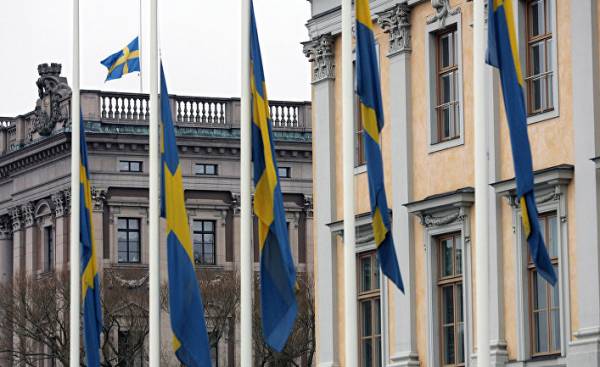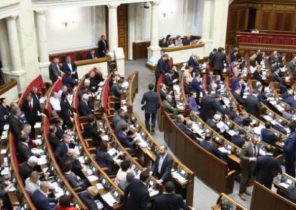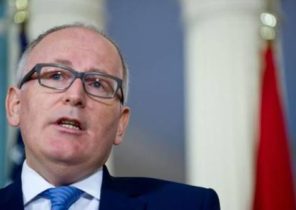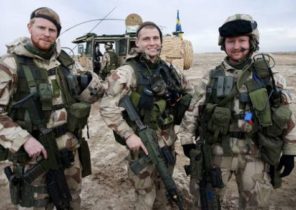
The path to greater security and good relations of the societies and people is through cooperation. It would be very wise to invest one to two billion of our budget in cross-border cooperation, which can help to achieve trust and understanding between the peoples of Sweden and Russia, says scientist and writer Lars Ingelstam.
Relations of Sweden and Russia — bad. Russia’s actions in Ukraine and arms build-up led to a substantial revision of the tools provided by the armed forces: 26 additional billion over five years and another 500 million this year.
Diplomatic ties between the two countries are very cool, although described as normal.
But one-sided emphasis on the state and the army may cause fear, creating an enemy. The path to greater security and good relations of the societies and people is through cooperation. It is undeniable, and it is openly confirmed by the Ministers of foreign Affairs Sergey Lavrov and Margot Wallström (Margot Wallström), on 21 February this year. But no continuation in public debates or in the form of concrete measures followed. In the study “Contacts with Russian and Russia”, which was released 16 may, offers many examples of collaboration that could be developed.
Exchanges between sister cities formed the basis of the rapprochement between the Scandinavian countries. Between the Swedish and Russian cities there were 30 registered exchanges, but now continue to operate only about a dozen. This year starts a new initiative under the leadership Centre for local democracy (and with the support of the Directorate for international cooperation for development, Sida), will take part in it eight partners from the Swedish side and about 15 — Russian. Russia showed great interest. You should create the preconditions for wider exchanges in the Scandinavian model, including schools, choirs, associations, churches and local politicians.
Today it is difficult to establish contacts between the different organizations in civil society, because the Russian partners run the risk of being labeled “foreign agents.” The situation is difficult, but not hopeless.
In the North, in the Barents sea takes a long time extensive cooperation of four countries — Russia, Sweden, Norway and Finland. Partners are less dependent on Moscow and other capitals, is a lot of friendly contacts between people, including the cooperation of those in the region responsible for the protection of the environment, for transport and for rescue work. Thus, we have models of direct and trustful cooperation between people and societies.
Tourism is an interesting topic. In General, the interest of the Russian to Sweden is high, but the indicators of tourism fell because of the Russian middle class has less money to travel.
As soon as this situation changes, the market is expecting a powerful take off. The number of ordinary Swedish tourists in Russia. However, the large potential of visits and meetings in the twin cities or travel interest: culture, religion, science, sport…
As for culture, the Embassy of Sweden in Moscow and the Consulate General in St. Petersburg actively promote Swedish culture in Russia.
Their work is based on the principles of common sense, but in projects and exchanges in its framework it is necessary to allocate at least 10 million.
Another advanced area of the Swedish-Russian cooperation — studying of Russian journalists, which has long been organized by the University Linnaeus. This is an important element in support of press freedom and professional journalism.
Russia needs a modern and well-functioning institutions. Our Finance Ministry (!) for almost 30 years and have developed practical cooperation in budgetary matters. Long continues cooperation with neighbors in the nuclear industry, and it can be extended. Border agencies (police, customs, shipping, rescue on waters) are working on a permanent basis. But you can do more.
Ecology of Baltic sea — our common problem for which you are responsible, both scholars and authorities. In the period from 1991 to 2007, much has been done in the social areas such as helping children and youth in difficult life situations. Such work can be resumed, with a fairly wide extent.
The relations deeply affect students and language exchanges, but in the present situation they are not widespread. Prerequisites can and improve. For example, start with the abolition of tuition fees for students from Russia to Swedish universities.
In order to achieve peace and “friendship between peoples” (as stated in the UN Charter), military deterrence is not enough. The necessary diplomatic work, but its capabilities are limited. Of course, the heart of Putin will not relent and “the situation in the security sphere” will not improve if we just show that we are generally friendly to the Russian people.
On the contrary, cooperation is necessary to achieve the creation of such a European order of security, which all claimed to aspire to. Is only the beginning.
So it was in Scandinavia: we are not at war now 203 years. So it was in Western Europe: 72 years without war (of these, 65 years — from the ECSC, EEC and EU). Better times will come and we can do a lot to make it happen as soon as possible. Delicate but not impossible task.
It would be very wise to invest one to two billion of our budget in cross-border cooperation, which can help to achieve trust and understanding.
But the responsibility lies not only with the state. That is why it is necessary to implement new and renewed initiatives, and this position should be reflected not only in the autumn draft budget and plans the activities of various agencies and research institutions, academies and councils for culture as well as churches, trade unions, student communities, environmental and sports organizations.
Lars Ingelstam a scientist, writer, Professor Emeritus in mathematics, technology and social reform. In 1968-1972 he worked at the Swedish Institute of defense research. In particular, known for his criticism of an exaggerated attention today is on economic growth.







